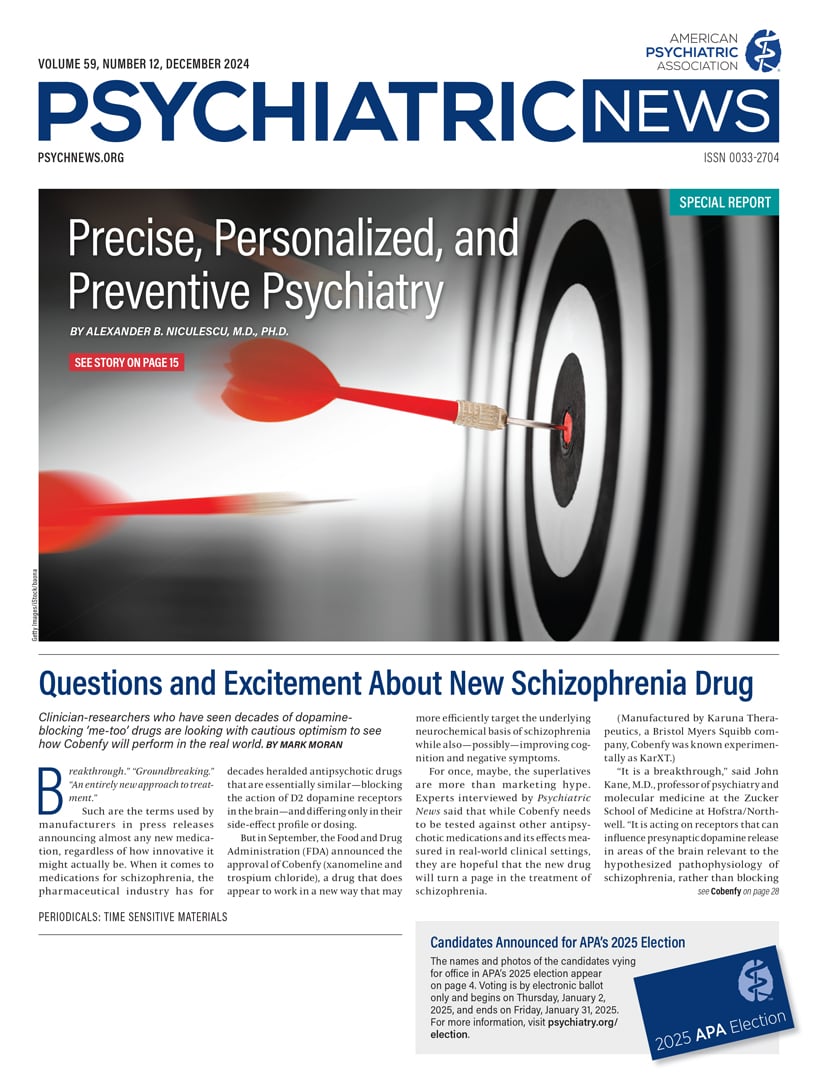Psychiatrists and other clinicians should carefully assess the potential weight-gaining effects of medications they prescribe whenever possible, particularly for patients with preexisting obesity, according to an obesity expert who spoke at APA’s Mental Health Services Conference in September.
“Medicine is so siloed, and patients see so many different specialists now,” said Kimberly A. Gudzune, M.D., M.P.H., chief medical officer for the American Board of Obesity Medicine Foundation. “When patients come to see me, they can be taking five or more different weight-gain-promoting medications, and they don’t even realize it. No one has ever told them that.”
Research shows an increasing share of Americans are taking obesogenic medication: 20% of U.S. adults took at least one such medication in 2017-2018, up from 13% in 1999-2000, according to a study by Craig Hales, M.D., M.P.H., M.S., and colleagues issued in Obesity in 2021. Gudzune reviewed some common obesogenic medications that psychiatrists prescribe, and recommended favorable alternatives:
•
Antidepressants: SNRIs, tricyclics, and certain SSRIs (escitalopram and paroxetine, particularly) may increase appetite and/or trigger food cravings. Better choices include bupropion and trazodone.
•
Atypical antipsychotics: These cause increased appetite and often trigger binge eating. Ziprasidone and aripiprazole are two better options. Whenever an atypical antipsychotic is prescribed, clinicians should consider adding metformin to reduce weight gain.
•
Mood stabilizers/anticonvulsants: Carbamazepine, gabapentin, lithium, and valproate are all associated with greater weight gain. A better option is lamotrigine.
Other common medications that may promote obesity include steroids; antihistamines; certain antihypertensives; contraceptives that contain progesterone, particularly injectables; and certain diabetes drugs, including insulin, sulfonylureas, and thiazolidinediones, Gudzune added.
Communication Is Key
The prevalence of obesity has significantly increased in the past 25 years, and now affects 40% of Americans, including nearly 10% who have “extreme obesity,” defined as a body mass index (BMI) of 40 and above, Gudzune said. Yet she noted that fewer than half of individuals with obesity receive weight-loss counseling from their primary care physicians.
Research has also shown that physicians engage in less rapport-building with obese patients and are less likely to perform certain physical exams on obese patients, such as pap smears. “Weight bias is incredibly prevalent in our society, and that is also true in the medical setting,” Gudzune said.
“Obesity is a chronic, relapsing, progressive disease, so it’s not enough to just tell people to eat less and move more,” she said. “How we as clinicians communicate with our patients about obesity really matters.”
Two effective techniques for clinician communication involve the use of motivational interviewing techniques and the “5As framework,” originally created to help people quit smoking. Both techniques are associated with increased patient confidence around making dietary changes and better results, Gudzune said.
The 5As framework for obesity involves the following: 1) Assess the patients’ condition. 2) Advise on the benefits of weight loss and the risks of obesity. 3) Agree on goals and strategies. 4) Assist with creating a treatment plan. 5) Arrange for follow-up to monitor goals and progress made.
Setting Realistic Goals
Gudzune advised clinicians to use BMI for initial obesity screenings, and if patients screen positive, to use the Edmonton Obesity Staging System, which also factors in comorbidities, physical and psychological symptoms, functional limitations, and quality of life. The tool also helps determine the intensity of services that a patient needs.
Gudzune said it is important to have realistic expectations when considering treatment options. Patients treated with a multicomponent lifestyle intervention that addresses nutrition, physical activity, and behavior change typically lose between 2% and 8% of baseline weight. Whether in person or virtual, key components of such programs include multidisciplinary teams with mental health and other clinicians, frequent clinician-patient contact, and accommodation of patient preferences.
Individuals who need to lose 10% or 20% of their weight, such as those with cardiometabolic disorders, may need anti-obesity medications to do so. “Are there examples of patients who successfully lose 20% of their body weight with exercise and dietary changes alone?” Gudzone said. “Yes, but those are the exceptions, not the rule. We need to be thinking about matching our treatments with the goals.”
Gudzune reviewed meta-analytic data showing average weight losses for the following medications, as well as the results of trials involving individuals with serious mental illness (SMI) when available:
•
Orlistat: Loss of 3.1% more than those on placebo; among participants with SMI, very modest weight loss.
•
Phentermine-topiramate: Loss of 8% more than placebo.
•
Naltrexone-bupropion: Loss of 4.1% more than placebo. One small randomized clinical trial (RCT) among participants with schizophrenia who were smokers found no weight or cardiometabolic benefits compared with placebo at 24 weeks. A systematic review found few studies, with mixed evidence on treating antipsychotic-induced weight gain.
•
Liraglutide: Loss of 4.7% more than placebo. An RCT among participants with schizophrenia who were taking either clozapine or olanzapine and had prediabetes reported a weight loss of 4.5% and 0.2% A1c reduction at 16 weeks. Another RCT among patients with schizophrenia, schizoaffective disorder, or first-episode psychosis found that half of participants lost ≥5% weight loss at three months, and it was sustained at six months.
•
Semaglutide: Loss of 11.4% more than placebo. One small study of individuals with antipsychotic-induced weight gain (for whom metformin did not help) reported that most lost weight. Another study found that antidepressant medication use was not associated with differences in weight loss with semaglutide. Other trials involving individuals with SMI are ongoing.
•
Tirzepatide: Loss of 12.4% more than placebo; no data yet on people with SMI.
Gudzune noted that metabolic-bariatric surgery results in the best weight loss, averaging 25% to 40%. Sometimes patients are not ready to consider such higher-level interventions, she added, “so it is important to meet patients where they are.” ■

